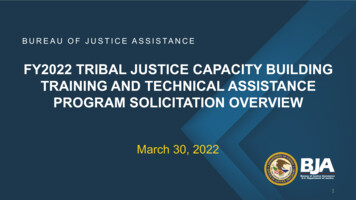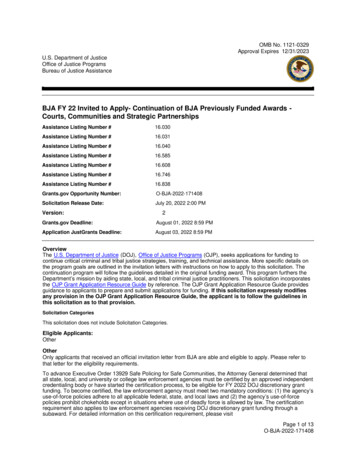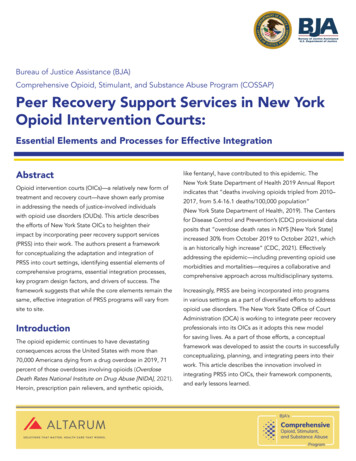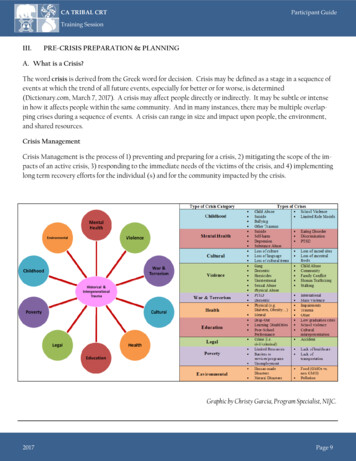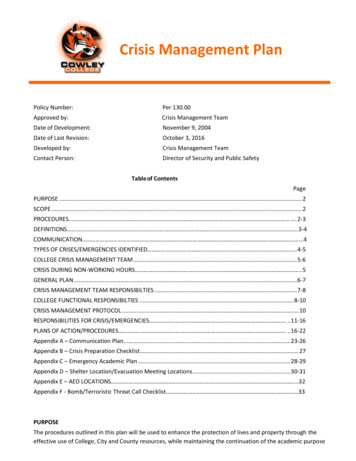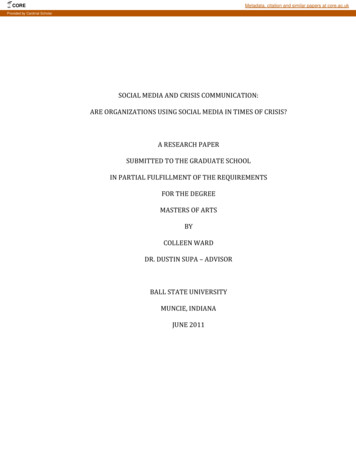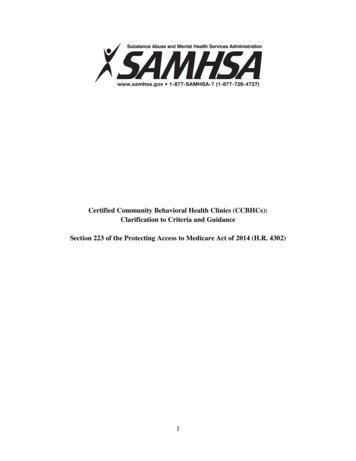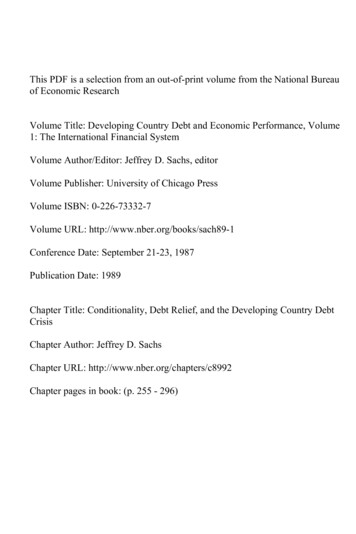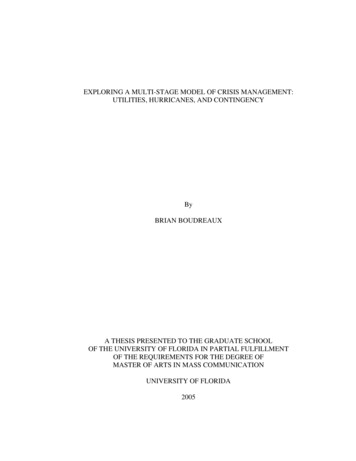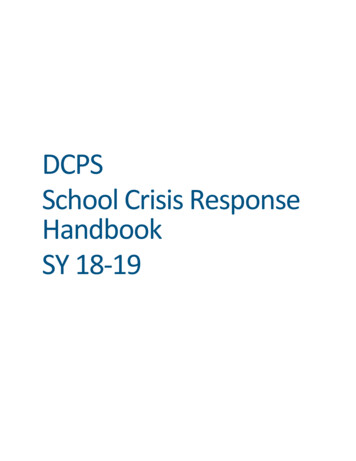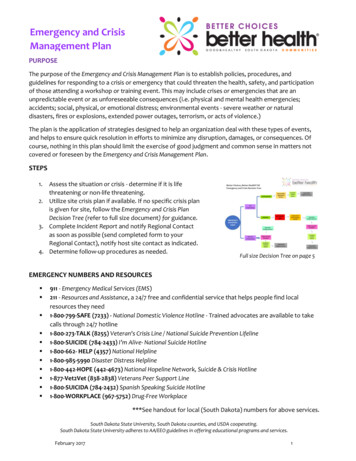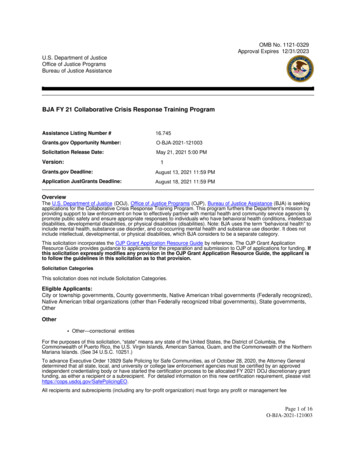
Transcription
OMB No. 1121-0329Approval Expires 12/31/2023U.S. Department of JusticeOffice of Justice ProgramsBureau of Justice AssistanceBJA FY 21 Collaborative Crisis Response Training ProgramAssistance Listing Number #16.745Grants.gov Opportunity Number:O-BJA-2021-121003Solicitation Release Date:May 21, 2021 5:00 PMVersion:1Grants.gov Deadline:August 13, 2021 11:59 PMApplication JustGrants Deadline:August 18, 2021 11:59 PMOverviewThe U.S. Department of Justice (DOJ), Office of Justice Programs (OJP), Bureau of Justice Assistance (BJA) is seekingapplications for the Collaborative Crisis Response Training Program. This program furthers the Department’s mission byproviding support to law enforcement on how to effectively partner with mental health and community service agencies topromote public safety and ensure appropriate responses to individuals who have behavioral health conditions, intellectualdisabilities, developmental disabilities, or physical disabilities (disabilities). Note: BJA uses the term “behavioral health” toinclude mental health, substance use disorder, and co-occurring mental health and substance use disorder. It does notinclude intellectual, developmental, or physical disabilities, which BJA considers to be a separate category.This solicitation incorporates the OJP Grant Application Resource Guide by reference. The OJP Grant ApplicationResource Guide provides guidance to applicants for the preparation and submission to OJP of applications for funding. Ifthis solicitation expressly modifies any provision in the OJP Grant Application Resource Guide, the applicant isto follow the guidelines in this solicitation as to that provision.Solicitation CategoriesThis solicitation does not include Solicitation Categories.Eligible Applicants:City or township governments, County governments, Native American tribal governments (Federally recognized),Native American tribal organizations (other than Federally recognized tribal governments), State governments,OtherOtherOther—correctional entitiesFor the purposes of this solicitation, “state” means any state of the United States, the District of Columbia, theCommonwealth of Puerto Rico, the U.S. Virgin Islands, American Samoa, Guam, and the Commonwealth of the NorthernMariana Islands. (See 34 U.S.C. 10251.)To advance Executive Order 13929 Safe Policing for Safe Communities, as of October 28, 2020, the Attorney Generaldetermined that all state, local, and university or college law enforcement agencies must be certified by an approvedindependent credentialing body or have started the certification process to be allocated FY 2021 DOJ discretionary grantfunding, as either a recipient or a subrecipient. For detailed information on this new certification requirement, please visithttps://cops.usdoj.gov/SafePolicingEO.All recipients and subrecipients (including any for-profit organization) must forgo any profit or management feePage 1 of 16O-BJA-2021-121003
Contact InformationFor technical assistance with submitting the SF-424 and SF- LLL in Grants.gov, contact the Grants.gov CustomerSupport Hotline at 800–518–4726, 606–545–5035, at Grants.gov customer support webpage, or email atsupport@grants.gov. The Grants.gov Support Hotline operates 24 hours a day, 7 days a week, except on federalholidays.For technical assistance with submitting the full application in DOJ’s Justice Grants System (JustGrants), contact theJustGrants Service Desk at 833–872–5175 or JustGrants.Support@usdoj.gov. The JustGrants Service Desk operates 5a.m. to 9 p.m. eastern time, Monday–Friday, and 9 a.m. to 5 p.m. Saturday, Sunday, and federal holidays.An applicant that experiences unforeseen Grants.gov or JustGrants technical issues beyond its control that prevent it fromsubmitting its application by the deadline must email the National Criminal Justice Reference Service Response Center(Response Center) at grants@ncjrs.gov within 24 hours after the application deadline to request approval to submit itsapplication after the deadline.For assistance with any other requirements of this solicitation, contact the Response Center by telephone at800–851–3420 or TTY: 301–240–6310 (hearing impaired only) or by email at grants@ncjrs.gov. Response Center hoursof operation are 10 a.m. to 6 p.m. eastern time Monday through Friday, and 10 a.m. to 8 p.m. eastern time on thesolicitation close date.Submission InformationIn FY 2021, applications will be submitted to DOJ in a NEW two-step process.Step 1: Applicants will submit an SF-424 and an SF-LLL in Grants.gov athttps://www.grants.gov/web/grants/register.html. To register in Grants.gov, applicants will need to obtain a Data UniversalNumbering System (DUNS) and System for Award Management (SAM) registration or renewal.Step 2: Applicants will submit the full application including attachments in JustGrants at JustGrants.usdoj.gov.To be considered timely, the full application must be submitted in JustGrants by the JustGrants application deadline.OJP encourages applicants to review, the “How to Apply" section in the OJP Grant Application Resource Guide.Page 2 of 16O-BJA-2021-121003
ContentsContact InformationProgram DescriptionOverviewStatutory AuthoritySpecific InformationGoals, Objectives, Deliverables, and TimelineEvidence-Based Programs or PracticesInformation Regarding Potential Evaluation of Programs and ActivitiesPriority AreasFederal Award InformationAwards, Amounts and DurationsContinuation Funding IntentAvailability of FundsTypes of AwardsFinancial Management and System of Internal ControlsBudget InformationCost Sharing or Matching RequirementPre-agreement Costs (also known as Pre-award Costs)Limitation on Use of Award Funds for Employee Compensation: WaiverPrior Approval, Planning, and Reporting of Conference/Meeting/Training CostsCosts Associated with Language Assistance (if applicable)Eligibility InformationApplication and Submission InformationInformation to Complete the Application for Federal Assistance (SF-424)Standard Applicant Information (JustGrants 424 and General Agency Information)Proposal AbstractProposal NarrativeGoals, Objectives, Deliverables, and TimelineBudget and Associated DocumentationBudget Worksheet and Budget Narrative (Web-based Form)Indirect Cost Rate Agreement (if applicable)Financial Management Questionnaire (including applicant disclosure of high-risk status)Disclosure of Process Related to Executive CompensationAdditional Application ComponentsTribal Authorizing ResolutionResearch and Evaluation Independence and Integrity StatementDocumentation of Advancing DOJ Priorities (if applicable)Documentation of High-Poverty Areas or Persistent-Poverty Counties (if applicable)Disclosures and AssurancesDisclosure of Lobbying ActivitiesDOJ Certified Standard AssurancesApplicant Disclosure of Duplication in Cost ItemsDOJ Certifications Regarding Lobbying; Debarment, Suspension and Other ResponsibilityMatters; and Drug-Free Workplace RequirementsApplicant Disclosure and Justification – DOJ High Risk Grantees (if applicable)How to ApplySubmission Dates and 1111212121212121212Page 3 of 16O-BJA-2021-121003
Application Review InformationReview CriteriaReview ProcessFederal Award Administration InformationFederal Award NoticesAdministrative, National Policy, and Other Legal RequirementsInformation Technology (IT) Security ClausesGeneral Information about Post-Federal Award Reporting RequirementsFederal Awarding Agency Contact(s)Other InformationFreedom of Information and Privacy Act (5 U.S.C. 552 and 5 U.S.C. 552a)Provide Feedback to OJPApplication Checklist12121313131313141414141414Page 4 of 16O-BJA-2021-121003
Program DescriptionOverviewThe Department of Justice is committed to advancing work that promotes civil rights, increases access to justice, supportscrime victims, protects the public from crime and evolving threats, and builds trust between law enforcement and thecommunity.This initiative seeks to implement transdisciplinary crisis response training to educate and prepare law enforcement andcorrectional officers so that they are equipped to appropriately interact with people who have behavioral health conditionsor disabilities in the course of completing their job responsibilitiesStatutory AuthorityThis program is authorized by 34 USC 10651; Pub. L. No. 116-260, 134 Stat 1182, 1259.Specific InformationThis program seeks applications for grant funds from state, local, and tribal law enforcement and correctional entities to:1. Plan, develop, and deploy a best practice training program for officers that includes their community.2. Develop a strategy for deploying officers trained in crisis response during times of crisis.3. Evaluate, improve, and sustain community engagement and a best practice program.Awarded sites will be encouraged to develop programs that incorporate BJA’s Crisis Response and Intervention TrainingProgram curriculum and additional best practices that are designed to increase understanding of behavioral healthconditions and disabilities, develop empathy, navigate community resources, and increase de-escalation skills within theapplicant organization and among staff, and include the community. For information about the curriculum—including abrief description and the curriculum matrix—visit the Academic Training web page.All applicants should be aware that under federal law, OJP may not award grant funds to procure or obtain anyequipment, system, or service that uses “covered telecommunications equipment or services” as a substantial or essentialcomponent of any system or as critical technology as part of any system. In general, with limited exceptions, “coveredtelecommunications equipment or services” includes telecommunications and video surveillance equipment or servicesproduced by a foreign entity that is specifically designated by statute, or designated by the federal government pursuant tostatute.Applicants also should be aware that, in accordance with DOJ and OJP policy, and with few exceptions, OJP will prohibituse of award funds for unmanned aircraft systems (UAS), absent advance submission of specific documentation ofprotections in place for privacy, civil liberties, and public safety and mitigation of cybersecurity risks. In addition, OJP willbar use of award funds for the purchase or use of UAS made by certain foreign entities as designated by DOJ.Goals, Objectives, Deliverables, and TimelineGoalTo support crisis response training for state, local, and tribal law enforcement and correctional entities that will ensureorganizational planning, strategically deploy those who have been trained, and ensure sustained best practices.ObjectivesBJA is seeking applicants that will:Perform a problem analysis, in collaboration with local stakeholders and agency leadership, using relevantdata. Applicants will use this analysis to understand the training, partnership, resource, and deploymentneeds of the applicant entity and its community.Develop a comprehensive training plan that anticipates future deployment models which will determine thetraining needs of the applicant entity.Create, design, and implement a training program. BJA encourages using BJA’s Crisis Response andIntervention Training Program curriculum which includes best practices from Memphis Model CrisisIntervention Teams training, Disability Response, Co-Responder, Behavioral Health Mobile Response, CaseManagement, and other response models. A matrix of the modules can be found here.Seek and deploy other best practice training for officers to educate them on behavioral heatlh conditions anddisabilities.Define and track process measures as well as short-term and long-term program outcome measures.Program measures may include increased knowledge, skills, improved responses, and safer encounters.Page 5 of 16O-BJA-2021-121003
Employ data-driven practices (e.g., report program performance to stakeholders) to improve programimplementation.Build long-term sustainment through a train-the-trainer component.Determine who are the best qualified officers to train and recruit them.Improve officer and citizen safety through increased community collaboration, communication, anddeployment strategies.Build positive community relations and trust through increased outreach to citizens, families, advocates, andstakeholders.Enhance officer knowledge of mental health, behavioral health, reentry and wrap around services, disabilityresources, and diversion opportunities through the delivery of crisis response training which includes servicepartners and associated community agencies as co-trainers.Engage BJA’s National Law Enforcement Mental Health Learning Site Program as part of an ongoingtraining strategy.As needed, provide information to and actively collaborate with BJA and BJA‘s partners on program processand outcome evaluation efforts.DeliverablesApplicants must submit applications that propose both planning process and implementation phases for the trainingprogram for law enforcement or correctional officers.1. The planning phase is up to 12 months long to design the training program within the applicant entity incoordination with community partners. At the conclusion of the planning phase, grantees will submit theirimplementation plan to BJA’s training and technical assistance (TTA) provider. Specifically, grantees will:Develop a coordinated and documented training approach and deployment strategy with BJA’sdesignated TTA provider, as needed.Outline a plan for obtaining the necessary support to administrate and sustain the training and continuethe proposed collaboration program following the conclusion of federal support.2. Implement, evaluate, track, and sustain the training program: Deliver crisis response training (preferablyBJA’s Collaborative Crisis Response curriculum) as outlined in the implementation plan. Grantees can expectto begin implementation once the planning phase is complete and the implementation plan has been reviewedand accepted by BJA’s TTA provider.3. Deliverables should correspond to and incorporate the objectives described above.4. Provide BJA with regular ongoing data pertaining to the number of officers trained, activities, and theoutcome of the trainings.The Goals, Objectives, and Deliverables are directly related to the performance measures that demonstrate the results ofthe work completed, as discussed under the Application and Submission Information section.Evidence-Based Programs or PracticesOJP strongly emphasizes the use of data and evidence in policymaking and program development in criminal justice,juvenile justice, and crime victim services. For additional information and resources on evidence-based programs orpractices, see the OJP Grant Application Resource Guide.Information Regarding Potential Evaluation of Programs and ActivitiesOJP may conduct or support an evaluation of the programs and activities funded under this solicitation. For additionalinformation, see the OJP Grant Application Resource Guide section entitled “Information Regarding Potential Evaluationof Programs and Activities.”Priority AreasThe Department of Justice is committed to advancing work that promotes civil rights, increases access to justice, supportscrime victims, protects the public from crime and evolving threats, and builds trust between law enforcement and thecommunity. In FY 2021, OJP will give priority consideration in award decisions to applications that demonstrate ways inwhich their projects will advance one or more of these areas.Page 6 of 16O-BJA-2021-121003
To receive priority consideration for advancing one or more of the Department’s priorities, the applicant must provide asufficient narrative explanation as an attachment, that specifies how the project will advance the promotion of civil rights,access to justice, support to crime victims, protecting the public from crime and evolving threats, or building trust betweenlaw enforcement and the community.In addition, OJP will give priority consideration, if applicable, to applicants that demonstrate that the individuals who areintended to benefit from the requested grant reside in high-poverty areas or persistent-poverty counties.To receive priority consideration under the poverty priority, the applicant must provide information to demonstrate that theindividuals who are intended to benefit from the requested grant reside in high-poverty areas or persistent povertycounties. For purposes of this priority consideration, the term ‘‘high-poverty area’’ means any census tract with a povertyrate of at least 20 percent as measured by the 2013–2017 5-year data series available from the American CommunitySurvey of the Census Bureau (applicants may search by census tract at -tools/narrative-profiles/2017/) and the term ‘‘persistent poverty counties’’ means any county that has had 20percent or more of its population living in poverty over the past 30 years, as measured by the 1990 and 2000 decennialcensuses and the most recent Small Area Income and Poverty Estimates (applicants may search by county ec/census-poverty.html and at .Priority consideration is one of many factors that OJP considers in making funding decisions and is not a guarantee of anaward.Federal Award InformationAwards, Amounts and DurationsAnticipated Number of Awards46Anticipated Maximum Dollar Amount of Awards 150,000.00Period of Performance Start Date10/1/21 12:00 AMPeriod of Performance Duration (Months)36Anticipated Total Amount to be Awarded Under Solicitation 6,900,000.00Continuation Funding IntentBJA may, in certain cases, provide additional funding in future years to awards made under this solicitation, throughcontinuation awards. OJP will consider, among other factors, OJP’s strategic priorities, a recipient’s overall managementof the award, and progress of award-funded work, when making continuation award decisions.Availability of FundsThis solicitation, and awards (if any are made) under this solicitation, are subject to the availability of appropriated fundsand to any modifications or additional requirements that may be imposed by the agency or by law. In addition, nothing inthis solicitation is intended to, and does not, create any right or benefit, substantive or procedural, enforceable at law or inequity by any party against the United States, its departments, agencies, or entities, its officers, employees, or agents, orany other person.Types of AwardsBJA expects to make awards under this solicitation as grants. See the “Administrative, National Policy, and Other LegalRequirements” section of the OJP Grant Application Resource Guide for a brief discussion of important statutes,regulations, and award conditions that apply to many (or in some cases, all) OJP grants (and cooperative agreements).Financial Management and System of Internal ControlsAward recipients and subrecipients (including recipients or subrecipients that are pass-through entities) must, asdescribed in the Part 200 Uniform Requirements as set out at 2 C.F.R. 200.303, comply with standards for financial andprogram management. The “Part 200 Uniform Requirements” means the DOJ regulation at 2 C.F.R. Part 2800, whichadopts (with certain modifications) the provisions of 2 C.F.R. Part 200. See the OJP Grant Application Resource Guide foradditional information.Page 7 of 16O-BJA-2021-121003
Budget InformationWhile applicants will be required to submit a budget for the entire 36-month project at the time of application submission,they may have the opportunity to revise their budgets based on any outcomes from the planning phase.Program budget approval and coordination with BJA’s TTA provider are required to complete the planning phase beforeimplementation can take place.Cost Sharing or Matching RequirementThis solicitation does not require a match.Pre-agreement Costs (also known as Pre-award Costs)See the OJP Grant Application Resource Guide information on Pre-agreement Costs (also known as Pre-award Costs).Limitation on Use of Award Funds for Employee Compensation: WaiverSee the OJP Grant Application Resource Guide information on Limitation on Use of Award Funds for EmployeeCompensation; Waiver.Prior Approval, Planning, and Reporting of Conference/Meeting/Training CostsSee the OJP Grant Application Resource Guide for information on Prior Approval, Planning, and Reporting ofConference/Meeting/Training Costs.Costs Associated with Language Assistance (if applicable)See the OJP Grant Application Resource Guide for information on Costs Associated with Language Assistance.Eligibility InformationFor eligibility information, see the solicitation cover page.For information on cost sharing or match requirements, see Federal Award Information.Application and Submission InformationThe following application elements MUST be included in the application submission for an application to meet the basicminimum requirements (BMR) to advance to peer review and receive consideration for funding:Proposal AbstractProposal NarrativeBudget Worksheet and Budget Narrative (web-based form)See the “Application Elements and Formatting Instructions” section of the OJP Grant Application Resource Guide forinformation on what happens to an application that does not contain all the specified elements or that is nonresponsive tothe scope of the solicitation.Information to Complete the Application for Federal Assistance (SF-424)The SF-424 will be submitted in Grants.gov. The SF-424 is a required standard form used as a cover sheet for submissionof pre-applications, applications, and related information. See the OJP Grant Application Resource Guide for additionalinformation on completing the SF-424.In Section F of the SF-424, please include the name and contact information of the individual who will completeapplication materials in JustGrants. JustGrants will use this information (email address) to assign the application to thisuser in JustGrants.Intergovernmental Review: This solicitation (“funding opportunity”) is not subject to Executive Order 12372. (Incompleting the SF-424, an applicant is to answer question 19 by selecting the response that the “Program is not coveredby E.O. 12372.”)Standard Applicant Information (JustGrants 424 and General Agency Information)The Standard Applicant Information section of the JustGrants application is pre-populated with the SF-424 data submittedPage 8 of 16O-BJA-2021-121003
in Grants.gov. Applicants will need to review the Standard Applicant Information in JustGrants and make edits as needed.Within this section, applicants will need to: add zip codes for areas affected by the project; confirm their AuthorizedRepresentative; and verify the organization's legal name and address.Proposal AbstractA proposal abstract (no more than 400 words) summarizing the proposed program, including primary activities, productsand deliverables, the service area, and who will benefit from the proposed program, will be completed in the JustGrantsweb-based form.As a separate attachment, the proposal abstract will not count against the page limit for the proposal narrative.In addition, the abstract must:In one sentence, identify the behavioral health conditions or disability response problem to be addressedand the proposed training.Include: the names of the lead applicant and partner applicant (justice, mental health, and disabilityagencies); if applicable, the target population and the proposed number of individuals the applicant plans toserve; the jurisdiction’s population and demographic characteristics; a brief description of how the applicantplans to address the problem; and the amount of federal funding requested.Indicate whether the applicant is a previous recipient of BJA law enforcement or justice and mental healthgrant funds and include the award number.Include a list of proposed subcontractors with the organization’s name, city, and state, if applicable.Proposal NarrativeThe proposal narrative should be submitted as an attachment in JustGrants. The attached document should be doublespaced, using a standard 12-point Times New Roman font; have no less than 1-inch margins; and should not exceed 10pages. Pages should be numbered and submitted as an attachment. If the program narrative fails to comply with theselength restrictions, BJA may negatively consider such noncompliance in peer review and in final award decisions.The following sections must be included as part of the proposal narrative:a. Description of the Issue:Identify or introduce the issue to be addressed by the grant and why this program/these proposed activitiesare necessary (significance/value).Describe and demonstrate understanding of the nature and scope of the problem to be addressed, usingdata and research as support.Describe successful efforts to date to address the needs identified.Describe the need for assistance and resources to address the problem.Briefly introduce how the applicant proposes to address the problem.b. Project Design and Implementation:Describe in detail the proposed deliverables for both the planning and implementation phases. Address indetail how the applicant proposes to undertake and accomplish the objectives and deliverables.Describe the strategy to address the needs identified in the Description of the Issue.Include a timeline/program plan that identifies the major tasks and deliverables of the proposed program andwho is responsible for each activity.Address whether any of the program-specific priority areas have been met.Explain the applicant's inability to fund the collaborative training program adequately without federalassistance.Specify how the federal support will be used to supplement, and not supplant, state, local, Indian tribe, ortribal organization sources of funding that would otherwise be available, including billing third-partyresources for services already covered under programs such as Medicaid, Medicare, and the StateChildren's Insurance Program.Page 9 of 16O-BJA-2021-121003
c. Capabilities and Competencies:Describe the capabilities and competencies of the applicant to manage the award.Provide a detailed description of the capacity of the partners and the key personnel to deliver the requiredtraining services and perform the key tasks described under Project Design.Include a letter(s) of support from the program partners and the applicant’s agency executives demonstratingagency commitment to the program. Demonstration of the partners’ commitment will contribute to assigningpoints for this criterion during the application’s review.Describe how the proposed management structure, scheduling, and staffing of the program will facilitate thedelivery of the required services. The management and organizational structure described should match thestaffing needs necessary to accomplish the tasks outlined in the timeline/program plan. Informationregarding the personnel assigned to these tasks and whether their résumés and role descriptions areincluded will contribute to the assignment of points relative to this criterion.Describe the agency’s and community’s plans to continue the program and sustain the ongoing support fortraining with community partners.d. Plan for Collecting the Data Required for this Solicitation’s Performance Measures:Describe the manner in which the data required for this program’s performance measures will be collected,including the system(s) used and the person(s) responsible.Describe whether and how other relevant performance measures will be documented, monitored, andevaluated.Describe the process for measuring program performance. Identify who will collect the data, who isresponsible for performance measurements, and how the information will be used to guide and evaluate theimpact of the program.Describe the process to accurately report data.Note: Applicants are not required to submit performance data with the application. Rather, performance measuresinformation is included as an alert that successful applicants will be required to submit performance data as part ofthe reporting requirements under an award.OJP will require each successful applicant to submit regular performance data that demonstrate the results of thework carried out under the award. The performance data directly relate to the goals, objectives, and deliverablesidentified under “Goals, Objectives, and Deliverables.”Applicants can also visit OJP’s performance measurement page at www.ojp.gov/performance for an overview ofperformance measurement activities at OJP.Award recipients will be required to submit performance measurement data and performance reports in JustGrants.Examples of the performance measures questionnaire can be found at: Collaborative Crisis Response TrainingProgram Performance Measures (ojp.gov). Further guidance on the post-award submission process will beprovided, if selected for award.Note on Project EvaluationsAn applicant that proposes to use award funds through this solicitation to conduct project evaluations must follow theguidance under “Note on Project Evaluations” in the OJP Grant Application Resource Guide.Note: BJA proposes to provide program and outcome evaluation assistance through a BJA-funded TTA provider.Goals, Objectives, Deliverables, and TimelineApplicants will submit their program or project goals, objectives, deliverables, and timelines in the JustGrants web-basedform.Page 10 of 16O-BJA-2021-121003
Budget and Associated DocumentationBudget narratives should demonstrate generally how applicants will maximize cost effectiveness of grantexpenditures.Budget narratives should demonstrate cost effectiveness in relation to potential alternatives and theobjectives of the program.It is recommended that the budget clearly identify activities proposed in the planning and implementationphases.The budget should include costs associated with travel fo
BJA FY 21 Collaborative Crisis Response Training Program . To advance Executive Order 13929 Safe Policing for Safe Communities, as of October 28, 2020, the Attorney General . All recipients and subrecipients (including any for-profit organization) must forgo any profit or management fee . Page 1 of 16 O-BJA-2021-121003.
